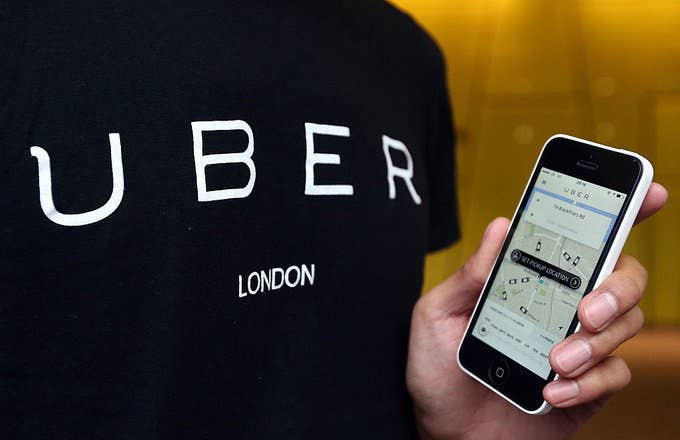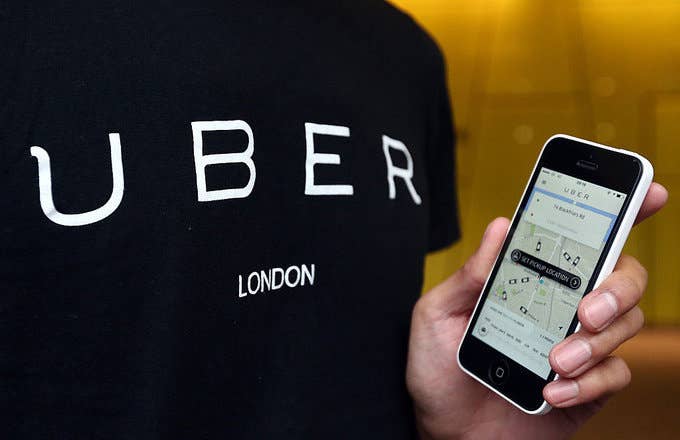
Starting Oct. 1, Uber will be stripped of its license to operate in London. The landmark decision was announced Friday, and is a substantial blow to the car-for-hire app, which currently employs more than 40,000 drivers in one of the world’s biggest cities, according to Reuters.
Wait, what?
If you're confused about what the hell is going on, I'm here to help break it down. Transport for London (TfL), the local government body that regulates the transport system in Greater London, shared the detailed reasoning behind this decision via Twitter:
TfL has today informed Uber that it will not be issued with a private hire operator licence. pic.twitter.com/nlYD0ny2qo
"Uber’s approach and conduct demonstrate a lack of corporate responsibility in relation to a number of issues which have potential public safety and security implications," TfL said. Among the issues raised by TFL is Uber's "approach to reporting serious criminal offences," which reflects issues reported in the States.
So it's a wrap, just like that?
The TfL statement indicates Uber’s license will not be outright terminated, but will expire and not be renewed after its current final date of operation, Sept. 30. Uber has 21 days to appeal, and will be allowed to operate until "any appeal processes have been exhausted." Uber, which makes up a third of private-hire vehicles in London, per Reuters, said it would contest the decision.
“Transport for London and the Mayor have caved in to a small number of people who want to restrict consumer choice,” Tom Elvidge, Uber’s general manager in London, told Reuters. “We intend to immediately challenge this in the courts.”
How did this happen?
London’s black cab drivers have been protesting Uber's presence in the transportation industry pretty much from the beginning, insisting that it has threatened their livelihoods and undercut safety rules.

So... is Uber gonna lose its license in other places?
While this decision might seem left field, if not a bit dramatic, it does make sense, given Uber's past and recent transgressions. The app has been forced to stop operating in several countries, including Denmark, Bulgaria, Italy and Hungary, for reasons like "unfair trade practices" and "unfair competition." In Australia, the app is completely banned in the Northern Territory. In China, the company was bleeding money—billions, reportedly—and was subsequently bought out by Chinese competitor Didi Chuxing. Barcelona is currently awaiting a ruling on the service after the city's main taxi operator accused Uber of running an "illegal taxi service."
The U.S. version of Uber has faced heavy criticism from unions and lawmakers, and been in constant legal battles over workers’ rights. In Austin, Texas, the company was forced to pull out after refusing to fingerprint and background check all prospective and current drivers. In Alaska, Uber operated for six months before pulling out because of a dispute over whether drivers were independent contractors or registered taxi drivers.
Uber is also still recovering from a series of scandals: the company faced incredible backlash when Uber drivers didn’t join a taxi strike in New York City after Donald Trump’s fucked up Muslim ban, leading to the #DeleteUber hashtag and hundreds of thousands of lost customers. In contrast, Lyft, Uber's main competitor, donated $1 million to the ACLU, and issued a statement condemning the ban.
There have also been allegations of sexism and bullying at the Silicon Valley start-up, and former CEO and co-founder Travis Kalanick was essentially forced out in June of this year. In February, a former engineer for Uber published a detailed account of how her numerous claims of sexual harassment were dismissed by upper management. Months later, in June, a board member resigned after making a sexist remark about a new female colleague.
Also in June, the U.S. Department of Justice launched an investigation into "Greyball," a software tool that identifies and avoids authorities in areas where Uber's service hasn't been approved.
Just be real—is Uber done for?
Not necessarily. For one, there are other Uber services, like UberEATS, that will be allowed to continue operating in London despite the decision to not renew the parent company's license.
Uber has also recently rolled out a series of changes in an attempt to improve condition for its drivers, including the introduction of in-app tipping and plans to increase certain fees.
Uber's issues vary from location to location, and each argument against its existence will be handled on a case-by-case basis. From here on out, it will be a piecemeal development. But for now, it's pretty safe to say that the company isn't going anywhere anytime soon. Even if they do, there's always Lyft.

